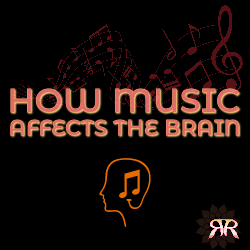Table of Contents
How does music affect the brain?
We know that listening to our favourite (or least favorite!) music affects the brain. But, have you ever wondered how music affects the brain? It certainly has the power to evoke a wide range of emotions and can have a profound impact on our mood and well-being.
It has been found that music activates more parts of the brain than any other known stimulus.
http://chordsforacause.org/410-2/
The relationship between music and the human brain is under intense scrutiny and is subject to many ongoing studies. Although there is still much to learn, so far we know that:
- Stimulates several areas of the brain.
- Activates the brain’s “reward centers”, including dopamine pathways.
- Improves cognitive function and may help patients with diseases such as Alzheimer’s, Parkinson’s, and depression.

Music affects the brain by…
Stimulating several areas.
Studies have shown that listening to music can stimulate several brain areas, including those responsible for processing emotions, memory, and movement.
When we listen to music, our brains come alive with activity. Numerous studies have shown that listening to music stimulates various regions of the brain. One such region is the auditory cortex, which processes and interprets sound. This area of the brain is responsible for recognizing different musical elements such as pitch, rhythm, and melody.
Furthermore, listening to music activates the limbic system, which is associated with emotions and memory. This can explain why certain songs can evoke strong emotional responses or trigger memories from the past. The limbic system comprises the amygdala, the thalamus, the hypothalamus, the hippocampus, the basal ganglia, and the cingulate gyrus.
Enhancing the release of dopamine.
Some music can activate the reward centers in the brain, leading to feelings of pleasure and releasing dopamine, a neurotransmitter associated with pleasure and reward.
The nucleus accumbens is responsible for releasing dopamine. This neurotransmitter is associated with pleasure and is released when we experience something enjoyable, such as listening to our favorite song.
Helping with learning and thinking
Another area that is stimulated by music is the prefrontal cortex. This region is involved in higher cognitive functions such as attention, memory, and problem-solving. Music has been shown to improve focus and concentration, which may be attributed to the activation of the prefrontal cortex.
One 1991 study suggested that listening to classical music while studying or performing mental tasks can improve spatial task performance. However, despite causing a big splash, and coining the term “The Mozart Effect”, the results were not as reliable as they seemed at first.
Neuromusic

I am studying for a Master’s in Neuromusic. Neuromusic is the intersectional study of neuroscience, psychology and music. I am currently focused on my thesis, whose working title is “Binaural Beats and the Breathing Brain”. This series of posts will serve to align my thoughts and support my studies. Eventually, these posts will form part of my written thesis.
I am a primarily self-taught songwriter, producer, and DJ. The formal study of how music affects the brain represents a very important step in my personal and professional evolution. So, if you are interested in learning alongside me, and maybe encouraging me, please bookmark this page and check in regularly.
Tune in and feel the flow
Overall, listening to music engages multiple areas of the brain, including the auditory cortex, prefrontal cortex, limbic system, and the reward system. Music has a significant effect on our brains, showing that it is a powerful tool for our emotional, cognitive, and physical well-being.
So next time you’re feeling down or in need of a mental boost, consider turning on some music and let your brain reap the benefits.
